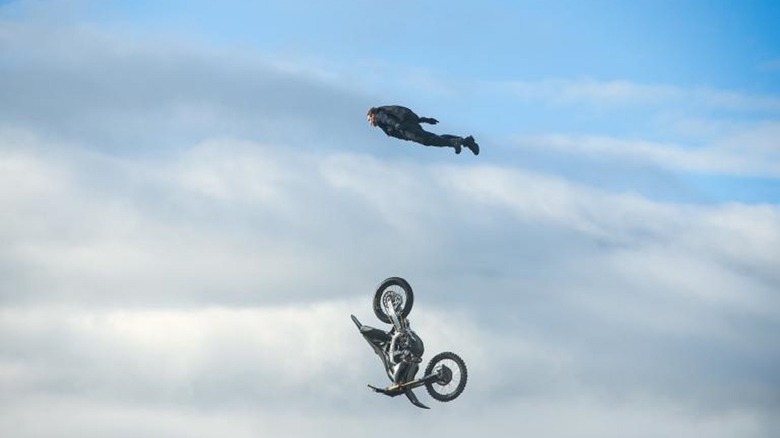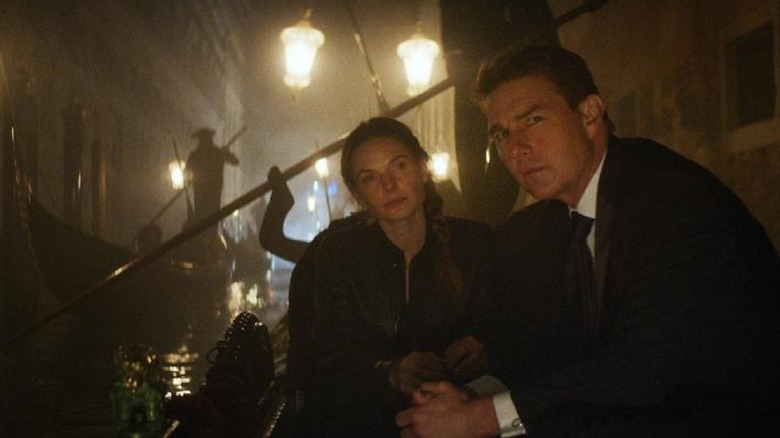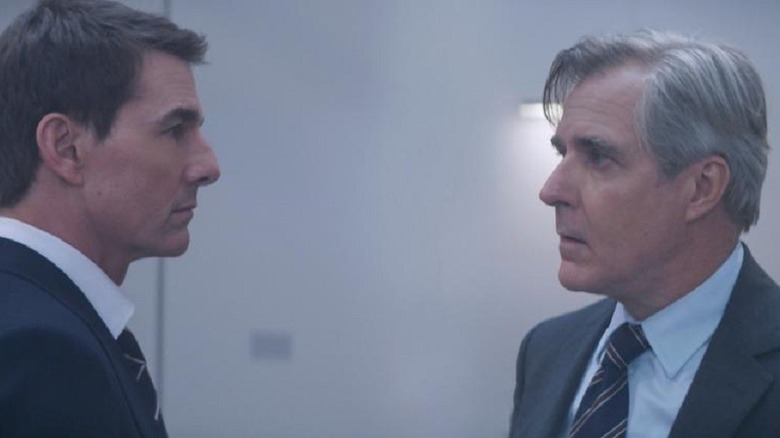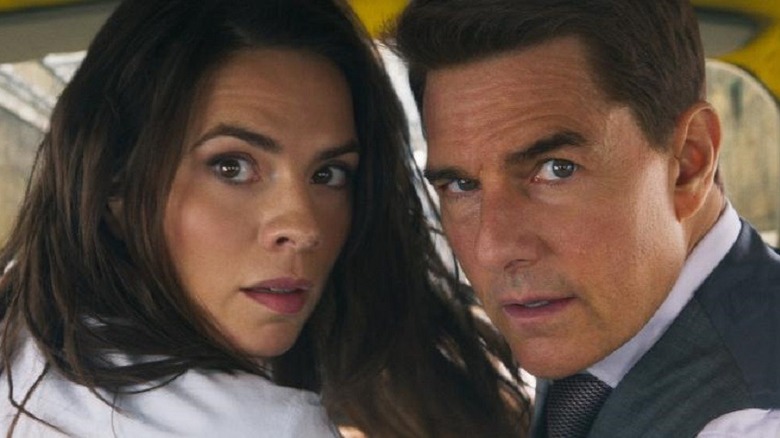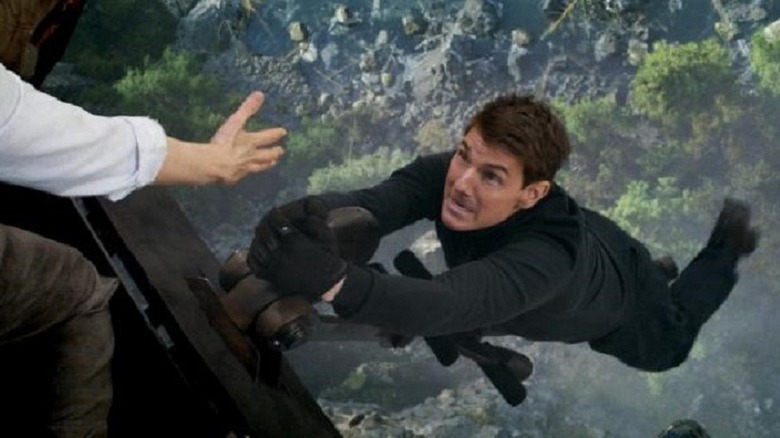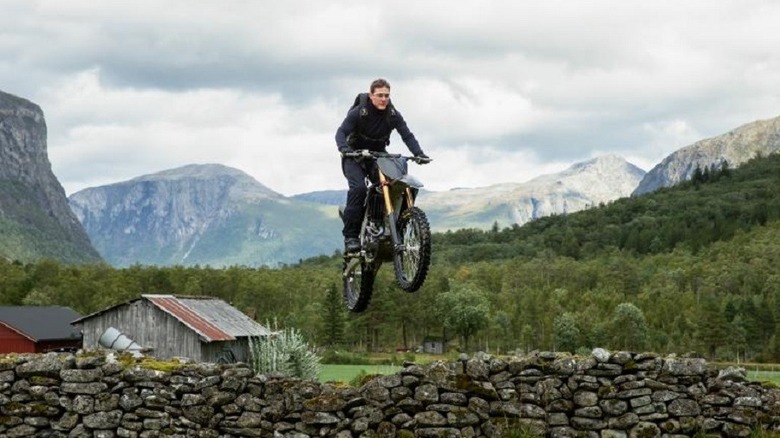Mission: Impossible - Dead Reckoning Part One Spoiler Review: A Masterpiece Of Action Filmmaking
Early in the greatest film of all time, "Singin' in the Rain," Don Lockwood (Gene Kelly) describes to a fawning group of fans his rise to fame in Hollywood. Part of that rise includes his career as a stuntman, from bar-fight scenes to more elaborate gags. In one stunt, Don puts on racing goggles, rides atop a motorcycle and sends it right over a huge cliff. If you watch "Singin' in the Rain" enough times, you may ask what type of movie would require that kind of stunt. Seven-plus decades later, with the action masterpiece "Mission: Impossible – Dead Reckoning Part One," we finally have the answer.
It is an unassailable truth that a few handfuls of images are among the greatest ever captured on film. Some examples: Kelly dancing with an umbrella on a rainy street at night. Mickey Mouse commanding the stars with the power of a sorcerer at his disposal. Marlon Brando's tank-top-wearing lout screaming to the heavens for his wife. Oh yes, and Tom Cruise running for his life and/or to save the lives of those around him, speaking not only to Cruise's intense and remarkable physicality but to an innate choice to always be the selfless hero.
Tom Cruise was born to run. He doesn't just run like hell in the "Mission: Impossible" films, but it's no accident that to commemorate his 61st birthday earlier this month, Paramount Pictures put together a supercut of his running in the franchise. Tom Cruise is one of our last living true-blue movie stars, and it's been more than 25 years since he helped create out of whole cloth a series that has ensured his presence on the Mount Rushmore of action heroes.
Yes, "Mission: Impossible" existed as a TV series decades before the opening film released in 1996, but Cruise – whose producing effort is not coincidentally the Brian de Palma film that kickstarted the franchise – was quite nakedly attempting to become an American James Bond. It got to the point where the actors from the TV series loudly criticized the film for running so far from the source material, including turning the show's lead into a villain who's killed off gruesomely. But that tracks, because Tom Cruise was born to run.
Choose to accept
While "Mission: Impossible" (1996) served as an origin story for Ethan Hunt, the sterling secret agent who is often the only person standing between humanity and certain doom, it only briefly touched on his past, let alone what led him to become an IMF agent. The excellent "Dead Reckoning: Part One" (despite being a mouthful of a title) offers some valuable hints. In the extended pre-credits section, we learn that the famous line – "Your mission, should you choose to accept it" – was once framed to Ethan as a true choice between working for the government or being sent to prison for life. Moreover, the script (by director Christopher McQuarrie and Erik Jendresen) makes it obvious that this choice is extended to anyone in the same appropriately unpleasant situation: become an IMF agent or descend gradually into oblivion.
The watchword in this new film is "choice." Ethan's first appearance, shrouded in shadows in Amsterdam, involves him receiving his new mission and commending the young deliveryperson for making the right choice to join the team. The power of a choice -– between life or death, between the types of choices a person can make, and so on –- weighs heavy here, even amidst the many breathtaking action sequences.
Choice is so powerful here because it represents the logical endpoint of the franchise, as we learn that Ethan Hunt's latest enemy is not truly a person. Yes, the enemy has human avatars, such as the odious Gabriel (Esai Morales), but Gabriel works on behalf of a ... thing: an artificial intelligence known only as the Entity. We first encounter the Entity as it reveals its power in the depths of the Bering Sea by fooling a Russian sub with terrifying nuclear power to fire missiles at a ghost sub before destroying the real one, sending its denizens to float to their death on the bottom side of a glacier. For all the talk in "Rogue Nation" and "Fallout" about Svengali-like villains reverse-engineering scenarios to ensure our heroes make decisions that enable their evil plans, this is the first time Ethan could be outmatched. Ethan defines himself as a ghost at one point; the Entity actually is one.
I understand you're upset
Ethan can't be a ghost, because his past hovers over him more than ever. When he receives his first mission, he's greeted by the all-too-familiar voice of current CIA Director Eugene Kittridge (Henry Czerny, making a very welcome return). All Kittridge tells Ethan is that his old friend Ilsa (Rebecca Ferguson) has absconded with one-half of a key and is looking to sell it to someone who owns the other half. Who has the other half? What does the key open? What does this mystery item do once unlocked? Answers are scarce, but bounty hunters are after Ilsa and the key in the Middle East, so Ethan has to get there first.
Choosing to do so – because of course Ethan does choose to help, and does get there first – creates complications. Aside from his voice, Kittridge is first seen meeting with other members of the intelligence community (portrayed by Rob Delaney, Indira Varma, Mark Gatiss, and Charles Parnell). All of them have a better sense of the power of the two-part key, something that feels more disturbing with the images of Russian sailors floating in our minds just as they floated under a glacier. As mysterious as their conversation is, it also turns funny –- this film is often very funny –- when the Director of National Intelligence (Cary Elwes) learns about the presence of the IMF for the first time and that Ethan's identity is classified even to him.
But Kittridge knows Ethan, enabling the latter to calmly enter this covert meeting and neutralize it by knocking everyone else out with a smoke bomb. The ensuing conversation is all the more thrilling if you've watched the original recently. There's the joy of watching Tom Cruise and Henry Czerny sharing another tense conversation, echoing the confrontation from the original at a restaurant with an opulent aquarium. (It's equally joyous to hear Kittridge once again tell Ethan "I understand you're upset.") There's even the delight of how McQuarrie cuts to the opening credits, as Kittridge realizes Ethan can only escape their current conversation by wearing a mask ... of Eugene Kittridge.
Kidding aside, the true reckoning of this film is Ethan's, with deep and powerful echoes to his past throughout. The most powerful comes courtesy of the aforementioned Gabriel. We don't yet know Gabriel's full history, but we do know that Gabriel and Ethan had a run-in of some kind before Ethan joined the IMF, and that Gabriel killed some woman (Mariela Garriga) close to Ethan.
Death is no stranger to Ethan Hunt even if he's escaped it directly for decades. When Kittridge notes that the mission will "cost you dearly," it's like he's a seer. Ethan has visited Kittridge because our hero has learned that the bounty on Ilsa's head was placed on her ... by Kittridge himself, as a way to get American hands on the key. Though Ilsa doesn't die there, her life soon hangs in the balance, because Gabriel and the Entity force Ethan to make a choice.
A mind-reader capable of shape-shifting
Ethan has to make many choices across a series of setpieces that take place primarily in a) the airport in Abu Dhabi, b) the rollicking roads of Rome, c) a nighttime affair in Venice, and d) the Austrian Alps. (There are a few moments of downtime in the 163-minute film, but after the opening credits roll, the film's action is primarily confined to these locations.) He, of course, chooses to accept his mission, and brings back Luther Stickell (Ving Rhames) and Benji Dunn (Simon Pegg). In Abu Dhabi, the plan is simple: they take their half of the key to meet a mysterious buyer, follow the buyer to Venice so they can figure out who the full key is being sold to, allowing them to learn what the key opens. The complications begin in the form of a beautiful jewel thief named Grace (Hayley Atwell), who steals the buyer's half of the key, throwing a wrench in the plan.
As Ethan tries to steer Grace towards the buyer and his plane in Venice, the team realizes there are two other complications: US intelligence agents and a nuclear bomb. The US agents — the irascible Jasper (Shea Whigham) and his partner Degas (Greg Tarzan Davis) -– serve a recognizable role, as interceptors who eventually side with Ethan out of professional respect. Whigham makes a meal of his role, especially the first time Jasper thinks he's captured Ethan in the airport, only to find someone completely different and immediately start grabbing the stranger's face in the hopes of finding a mask instead of human skin. And the way Jasper identifies Ethan as "a mind-reading, shape-shifting incarnation of chaos" is about as good as hearing the now-dead Alan Hunley define Ethan as the living manifestation of destiny.
That last complication is the real issue, and one that Benji and Luther try to keep from Ethan as he focuses on Grace. Benji, in particular, is sharp enough to realize that a bag flagged as dangerous at the baggage claim is apparently housing a nuclear bomb. "Apparently," because although Benji is able to disarm the bomb with less than a second to spare (naturally), the bomb shell is empty –- it was a test from the Entity, and one that has enabled it to learn more about Benji in the process.
No digital Tom
Tom Cruise and Ethan Hunt often feel interchangeable, and the threats represented in the series feel like manifestations of his current psyche, so it makes sense that artificial intelligence like the Entity is the bad guy now. (The apocryphal story of Cruise pushing back against a CG version of himself doing stunts in "Ghost Protocol," in which he purportedly said "there is no digital Tom," seems awfully relevant now.) For Ethan, the Entity is as primal and existential a threat as possible, undoing all the potential good the IMF can do and reigning over all world governments.
The sight of Gabriel in Abu Dhabi makes Ethan abort the mission, which speaks to how terrifying the former must be to the latter. Ethan would rather risk losing Grace and regrouping in Rome. Once there, Ethan only gets Grace out of police custody to take her on the run in a novel, thrilling, and hilarious car chase in which –- thanks to some ill-placed handcuffs –- she has to drive with his guidance. (Cruise is assured as ever, but it's when he gets to be funny, as when expressing a good deal of agita at her shaky driving skills, that he can be most enjoyable.) The challenge of the chase is that Gabriel's henchwoman Paris (Pom Klementieff) is a true psychopath, gleefully laughing as she takes an Italian police truck and rams into any and all innocent cars in her way. The chase concludes much the way the first section did –- with Grace evading Ethan's grasp once more, and Ethan forced to regroup, this time with Luther, Benji, and Ilsa taking him to Venice.
In Venice, Ethan is eventually presented with an impossible choice: either Grace or Ilsa has to die. He and his team meet the person who wants to sell the two-part key: Alana Mitsopolis (Vanessa Kirby), who realizes with everyone else that the nighttime rave they're attending was set up by the Entity. The echoes from the first "Mission: Impossible" are at their loudest here. Yes, there is the return of Kittridge, and sly references to the hacker nicknames Luther sported when he was a younger man.
But the most emotionally intense sequence in the original comes when a young Ethan tries and fails to save his team from sabotage, especially the lovely Sarah (Kristin Scott Thomas), who's stabbed to death by an offscreen attacker. The mirror image comes after Ethan tries to save both Grace and Ilsa. Yet he finally, after so many years of protecting those around him, loses someone: Ilsa. The sword fight between her and Gabriel teased in the trailer, coming at night on Venice's deserted bridges, is pitched at an almost operatic level (Lorne Balfe's score, throughout, is as solid as you can get). And it ends with tragedy, as Gabriel stabs her and leaves the scene before Ethan can get to her. Another immensely talented agent, who was as close to a lover as Ethan had ever had, and now gone.
The line that Cruise and McQuarrie walk here is precise and careful: the "Mission: Impossible" films do not work because they are brooding, grimdark affairs. They work because they are breathless, rollicking, suspenseful adventures. So even with the immense loss of Ilsa weighing on Ethan, Luther, and Benji, they frame her sacrifice as something that can enable their mission. When Grace takes the blame, noting that if it wasn't for her, Ilsa wouldn't be dead, Luther reverses it: Ilsa chose to ensure that Grace could survive. Because this film is all about choices, Grace is given the biggest one of all: to join the team, and not just because they need her for this one. We can talk about how the first "Mission: Impossible" is an origin story for Ethan Hunt, but we already meet him as an IMF agent. With "Dead Reckoning," we have something of an origin story for how an IMF agent is made, as Grace accepts the mission.
Grace, of course, accepts, as she and Ethan break into the Orient Express as it zooms through the Alps. The intent is for her to don a mask as Alana, intercepting the two halves of the key and learning from the buyer what it opens. As ever, the plan has immediate complications. The first and most pressing is that Gabriel is on the train, too, and he knows Ethan wants to be there too. So Gabriel takes out the engine workers and disables the train's brakes, meaning Ethan can't hop onto the train via motorcycle.
The sum of his choices
So we come back to the beginning. Benji can only lead Ethan to get to the train by the top of a cliff he has to reach by motorcycle. (As funny as it was in "Fallout" for Ethan to frustratedly tell Benji "I'm jumping ... out a window" to clarify why he'd stopped chasing a terrorist mid-sprint, it's much better to watch Ethan splutter his way through explaining to Benji that just parachuting off the cliff won't work.)
The convergent elements of the climax –- Gabriel learning from Elwes' National Intelligence director that his team built the Entity, and he wants to buy the key to destroy any evidence of having been involved; Kittridge appearing on the train to represent Elwes as buyer and referring to having worked with Alana's mother, the late arms dealer Max from the first film; Grace having to fend off American agents as well as the softening Paris and Gabriel -– are no less than thrilling than in watching the jaw-dropping long shot in which Tom Cruise really and truly drives a motorcycle off a cliff. The rest of the third-act sequence is quite amazing, as Ethan and Grace have to derail part of the train after Gabriel blows up a bridge to take it out his "old friend," and also jump to safety as train car after train car falls to its doom. But you kind of can't beat the latest edition of "Tom Cruise risks death to entertain worldwide audiences" with that motorcycle stunt.
"Our lives are the sum of our choices." Kittridge intones this to Ethan in the opening of "Mission: Impossible – Dead Reckoning Part One", and there is no doubt that the same is true for this franchise. A series of seemingly disparate choices over the span of nearly three decades, initially avoiding long-term continuity or returning characters only to embrace both of those aspects as a way to glimpse into Ethan Hunt's wounded soul, have led us to this point. This film's subtitle makes clear that the entire mission isn't over yet, though this ends cleanly enough as Ethan and Grace recapture both parts of the key from an infuriated Gabriel.
But there's still the matter of the Entity itself. We know why artificial intelligence is dangerous –- at least in this film's example –- but we also know from the pre-credits sequence that the real reason the Entity took out the Russian sub is because said sub is where it can be taken offline. "Dead Reckoning Part Two" is reportedly set to open in theaters next June. So we have until then to wonder this much: Tom Cruise has run up the side of the tallest building of the world, he's dangled off an airplane, and he's sailed off a cliff ... so what deadly stunt will he have to perform to take down an artificial intelligence housed in the bottom of the sea? And can he top the brilliance of this film? It's a big challenge, but not one to run from.
Knowing Tom Cruise, he'll run towards the challenge. Because ... well, he was born to run.
